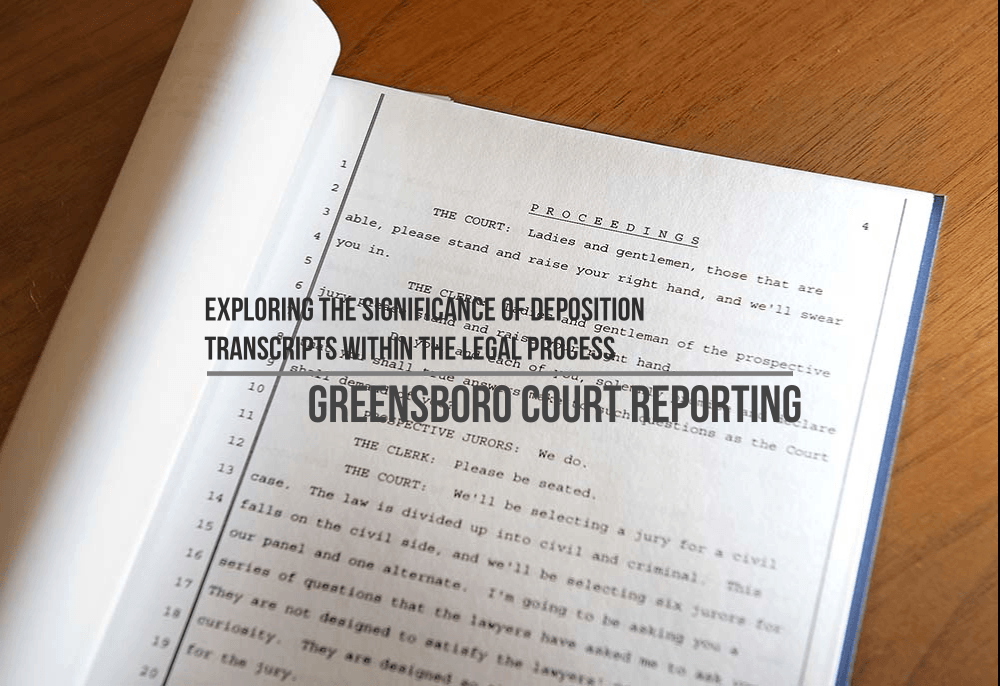Month: May 2023
Exploring the Significance of Deposition Transcripts within the Legal Process

Deposition transcripts play a crucial role in the legal process, enabling attorneys to obtain sworn testimony from witnesses and construct their cases. The significance of deposition transcripts cannot be understated, as they serve as invaluable assets that shape legal proceedings and facilitate effective case preparation. In this blog post, we will delve into the importance of deposition transcripts and shed light on how they influence the legal landscape.
1. Preserving an Unalterable Record
Deposition transcripts serve as an unchangeable record of witness testimony given under oath. They capture the precise words spoken during the deposition, preserving the intricacies of the process. These transcripts become vital resources for attorneys as they review and analyze witness statements, identifying inconsistencies or contradictions that may arise and enabling them to develop appropriate strategies. The accuracy and precision of deposition transcripts play a critical role in ensuring justice and fairness within the legal system.
2. Indispensable for Discovery
Deposition transcripts serve as indispensable tools during the discovery phase of a case. Attorneys rely on these transcripts to gain valuable insights into the opposing party’s stance, bolster their arguments, and uncover potential evidence. By carefully studying the deposition transcripts, attorneys can identify key points that can be used to challenge witnesses during cross-examinations or support the testimonies of their own witnesses. These transcripts are invaluable for developing a comprehensive understanding of the case and formulating effective legal strategies.
3. Constructing a Compelling Case
Deposition transcripts provide attorneys with a wealth of information to construct a strong and persuasive case. By examining witness statements, attorneys can pinpoint favorable or damaging testimony that can significantly impact the case’s outcome. These transcripts allow attorneys to thoroughly prepare for trial, highlighting inconsistencies, contradictions, or credibility issues that can be leveraged to challenge opposing witnesses or corroborate their own client’s version of events. Armed with thorough deposition transcripts, a well-prepared attorney can present a compelling case and navigate the intricacies of the legal process with confidence.
4. Fostering Collaborative Case Preparation
Deposition transcripts facilitate collaborative case preparation among legal teams. Attorneys can share and discuss deposition transcripts with colleagues, paralegals, and experts to gain diverse perspectives and insights. These transcripts serve as the foundation for discussions and strategic planning, enabling the legal team to collectively analyze and interpret the information contained within them. Such collaboration enhances the overall quality of case preparation, ensuring that all aspects of the case are meticulously examined.
5. Documentation for Future Reference
Deposition transcripts also serve as valuable documentation for future reference. Attorneys can refer back to these transcripts during trial, redirecting witnesses or refreshing their memory on specific points raised during depositions. Moreover, deposition transcripts can be utilized for post-trial analysis, appeals, or any subsequent legal proceedings. They serve as permanent and reliable sources of information, allowing attorneys to revisit witness testimonies accurately and effectively.
Deposition transcripts constitute an integral part of the legal process, providing a verbatim account of witness testimony that can significantly influence the outcome of a case. They serve as crucial resources for attorneys during case preparation, discovery, and trial, enabling them to construct compelling arguments, challenge witnesses, and craft persuasive narratives. The accuracy, comprehensiveness, and accessibility of deposition transcripts contribute significantly to the pursuit of justice and the seamless functioning of the legal system.
The Crucial Role of the Production Department in Court Reporting Agencies

Behind every successful court reporting agency, there is a dedicated and skilled production department working diligently to ensure the accuracy, accessibility, and seamless delivery of legal transcripts and related services. This often unsung team plays a crucial role in the overall functioning of the agency, ensuring that the final product meets the highest standards of quality and professionalism. In this blog, we will delve into the significance of the production department in court reporting agencies and shed light on their essential responsibilities.
1. Transcript Indexing and Exhibits Management
Court cases typically involve a multitude of exhibits, documents, and other supporting materials. The production department plays a vital role in organizing and managing these items within the transcripts. They meticulously index exhibits, create hyperlinks, and embed them within the electronic transcript. This allows attorneys and other legal professionals to conveniently navigate through the record and access relevant exhibits with ease, saving valuable time during case preparation and review.
2. Transcript Quality Control
Maintaining a high standard of quality is paramount in court reporting agencies. The production department serves as the last line of defense, conducting rigorous quality control checks on the transcripts before they are delivered to clients. They meticulously review the document for accuracy, completeness, and adherence to agency guidelines. This ensures that the final product meets the expectations of clients and is ready to be used in legal proceedings.
3. Transcript Delivery and Accessibility
Efficient and timely delivery of transcripts is crucial in the legal field. The production department manages the logistics of transcript delivery, employing various methods such as secure file transfer, email, or physical media. They are responsible for ensuring that the transcripts reach the intended recipients promptly and securely. Additionally, the production team also plays a role in enhancing accessibility by providing transcripts in alternative formats, such as large print, Braille, or electronic formats compatible with assistive technologies, to accommodate individuals with disabilities.
4. Technology Integration and Advancements
In today’s digital age, court reporting agencies rely heavily on technology to enhance their services. The production department plays a pivotal role in keeping up with technological advancements and integrating them into their workflows. They work closely with other technology partners to optimize productivity, implement advanced transcription tools, and explore innovative solutions to streamline the production process.
The production department is an indispensable component of court reporting agencies, ensuring that legal transcripts are meticulously prepared, formatted, and delivered with accuracy and efficiency. Their commitment to quality control, transcript indexing, exhibit management, and embracing technology advancements contributes significantly to the overall success of the agency. Without the expertise and dedication of the production department, the vital services provided by court reporting agencies would not be possible, making them an essential pillar of the legal profession.